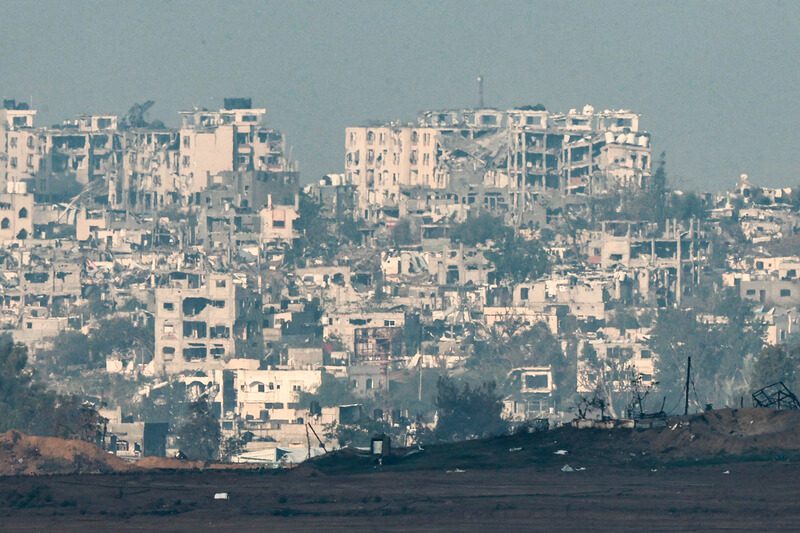Okay, Israel Will Defeat Hamas. But Will Palestine Be an Independent State?

The war between Israel and the Hamas terrorist organization in the Gaza Strip has been going on for two months. Tel Aviv intends to conduct a military operation until the complete destruction of the Palestinian militant group. However, there is still no clear vision of the future of this territory and Palestine as a state. The United States insists on the reunification of the Palestinian population of Gaza and the West Bank under a single administration with the subsequent creation of the state of Palestine.
But this scenario does not suit the Israeli government, and they have their own vision of the future. Zaborona’s editor Svitlana Hudkova analyzed what it might look like together with experts.
The buffer zone and control over the Gaza Strip
After the second month of the war, Israel still does not have a definite concept for the future of the Gaza Strip, which is a major concern for Washington. The United States, as well as the European Union, are interested in returning the territory of Gaza to the Palestinian National Authority (PNA) headed by Mahmoud Abbas. This proposal was rejected by Israeli Prime Minister Benjamin Netanyahu. Still, for Abbas, this possibility could cost him power, according to the expert of the Center for Civil Liberties, Orientalist Vyacheslav Likhachev.

“The Palestinian National Authority (PNA) is making significant efforts to stay in power in the West Bank. The last elections there were held in 2006, and the administration essentially lost its legitimacy. Holding another election is also not an option, because even in the West Bank, Hamas is much more popular than the current administration. If the PNA comes to Gaza at the bayonets of the Israeli army, it will finally lose the remnants of support among the Palestinian population, which Mahmoud Abbas does not want,” says the expert.
In his turn, Israeli Prime Minister Benjamin Netanyahu is counting on the creation of a buffer zone, which, under the control of international partners’ forces, will guarantee the security of the Israeli state.

“Israel wants to create a buffer zone along the border, deep into the Gaza Strip. There is an idea that control over this buffer zone will be transferred to international partners. And this is rather a proposal for the Arab countries that are most interested in rebuilding Gaza, namely Qatar and the UAE. This can prevent further control of the population by Hamas or other extremist organizations that pose a threat to Israel,” explains Vyacheslav Likhachev.
However, this is opposed in the United States, says Serhiy Danilov, deputy director of the Center for Middle East Studies.
“The United States will not agree to the idea of creating a buffer zone. No one will agree to this. Now it all depends on how the military campaign unfolds, which should move from north to south. Israel will try to create a buffer zone after the operation, but this idea is being harshly criticized. Therefore, it is not a fact that such a security zone will be created,” the expert believes.
In particular, Netanyahu expresses interest in maintaining control over the security sector in Gaza, which may mean a desire to maintain a certain degree of military presence in the territory. However, the Israeli government does not have a clear concept of what a political-civilian administration in Gaza will look like after the end of the military operation. According to Likhachev, it would be ideal for Israel to relinquish responsibility for the Gaza Strip, but not to create an uncontrolled political entity there.
“Most likely, international partners will be found, primarily among reliable Arab countries, who will create a hybrid civilian administration without political obligations, but with responsibility for the civilian sector. That is, Israel intends to launch other players that will contribute to the reconstruction of the Gaza Strip,” says the orientalist.
There are certain grounds for the United Arab Emirates to join the stabilization forces after the Israeli operation is over, Danilov adds. One of the well-known natives of Gaza, former Fatah leader Mohammed Dahlan, is now in the UAE. Israel does not rule out the possibility of transferring power to him in Gaza, the expert says.
“It is most likely that Dahlan will be in power. By the way, he is the biggest competitor and, in fact, an enemy of the current Fatah leader and head of the PNA, Mahmoud Abbas. Obviously, he will be negotiated with so that he tries to take control of Gaza. Sooner or later, the question of changing the power of Abbas, whose legitimacy is shallow, will arise,” said Serhiy Danilov.

In southern Israel near the border with the Gaza Strip on December 6, 2023. Photo: JACK GUEZ / AFP via Getty Images
The State of Palestine: Prospects for its creation
After the destruction of Hamas’ infrastructure and their removal from power, the international community sees a chance to restore Palestinian unity with the prospect of an independent Palestinian state. But Israel is not interested in such a scenario.
“The idea of creating a Palestinian state alongside Israel, taking into account the experience of the last 20-30 years, is not popular among Israelis. Israel sees that after it completely withdrew from the Gaza Strip in 2006 and de facto had no control over the territory for 17 years, it received a gradual escalation of aggression from Gaza in response, starting with rocket attacks and ending with the horrors of October 7. The authorities believe that as long as the basis for Palestinian identity and the popularity of local political actors is hatred of Israel, there is no question of any independent Palestinian state. If radicals take control there, Jerusalem will face the most powerful threat it has faced in decades,” explains Vyacheslav Likhachev.
But it is not only Israel that is still opposed to the creation of a Palestinian state. Abbas himself is not interested in this either. To a certain extent, he is satisfied that he is symbolically the leader of a state that has even been proclaimed, but at the same time does not bear full responsibility for the population, security, and challenges that will arise if Palestine becomes a state. “In this case, international financial assistance, for which the Palestinian National Authority actually exists, will certainly be reduced. That is why Abbas is not interested in such a development,” explains the orientalist.
Serhiy Danilov also believes that the creation of the state of Palestine is unlikely in the medium term. However, this possibility is not excluded if there is a change of power in Israel and the Palestinian Authority.





